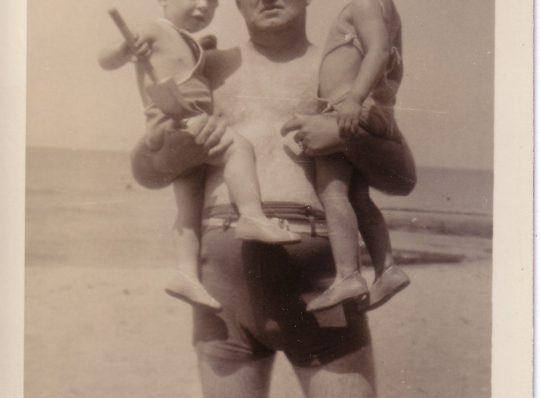by Joy Loverde
Let’s say your elderly Mom fell on the steps and kept it a secret for three months because she “didn’t want to bother  you.” Or conversations with Dad escalate into shouting matches on a regular basis. By now you’re so angry that you’re beginning to suffer from physical symptoms like headaches, poor sleeping patterns and loss of energy.
you.” Or conversations with Dad escalate into shouting matches on a regular basis. By now you’re so angry that you’re beginning to suffer from physical symptoms like headaches, poor sleeping patterns and loss of energy.
Parents know exactly what it takes to hit our hot buttons -- unwanted advice, criticizing statements, even a tone of voice can set us off and make it extremely difficult to keep us from doing and saying something we’ll regret later on.
Anger is part of being a human being, and that is a wonderful thing to be. What isn’t so great is feeling out of control when our anger gets the best of us. Managing and controlling our anger, even expressing our anger do not free us of it. After doing these things, our anger is still repressed, awaiting something else to trigger our emotions.
Understandably, there’s a lot to be angry about when it comes to being with our parents, especially as they get older. Spending time with them at this stage of their lives includes witnessing the emotional and physical pains they are enduring such as the death of other family members and friends, giving up the car keys, the onset of a chronic illness, and moving out of the family home.
Anger seems to be everywhere, and the combination of our anger and our parents’ anger is nothing less than explosive.
So how do we get through times like these without alienating or hurting each other – emotionally and otherwise? For sound advice, I turned to anger-management master, Mitch Messer, for answers. Since 1972, Mitch Messer has been helping people learn how to manage their anger and other destructive emotions in healthy, productive ways. Through years of study and one-on-one coaching, Messer developed a unique way of looking at anger that has revolutionized the lives of thousands of people who have adopted his methods. No longer are they trapped in a never-ending cycle of self-destructive behaviors but are able to create strong personal relationships and the possibility of happiness. Mitch Messer is the author of “Managing Anger.” Visit Mitch’s website at www.angerinstitute.com.
Joy: Mitch, what are the most common complaints you hear from adult children?
Mitch: One pattern of complaints against parents is their unreasonable demands on the adult child’s time. Parents’ demands imply, “I did this and that for you while you were growing up and now you do these things for me.” Adult children say their parents don’t know when to quit.
Joy: Have the relationships between adult children and their parents been angry ones all along?
Mitch: Many adult children hold grievances against their parents from childhood. The more parents shame the adult child in the present day, the more the adult child does not want to collaborate with the people who raised them. As neediness and dependency grows on the part of the parent, so does mutual contempt.
Joy: What’s your first line of approach when helping the angry adult child.
Mitch: I ask the adult child to think of a time when the parent angered him or her most in the past. We discuss that particular situation that happened in childhood and eventually pinpoint it as one of the focal points for getting even with the parent today. The power struggle continues because the adult child can finally disobey the parent. None of this is rational or civilized. Nobody is happy.
Joy: What can the angry adult child do at this point?
Mitch: The process of exploring the root of the adult child’s anger and resentment reveals what his or her attitude is toward the parent in the present. Sometimes the purpose of the negative behavior is to get revenge. Sometimes the anger is about power and negative control. The process reveals the individual to himself or herself. It’s not all about the parent. Rather it is what the adult child brings to the table from the past.
Joy: What do you mean it’s not about the parents? Aren’t they the ones who make us angry?
Mitch: There’s not much we can do about our parents’ attitudes, and there’s not much we can do to change the past. These are false, inappropriate objects. A more achievable goal is to change us. Adult children come to anger therapy because they are not happy. Their relationships are self-indulgent, counterproductive and ultimately self-destructive. They can’t win under those circumstances.
Joy: How can angry adult children make things better for themselves?
Mitch: The first step is to identify their feelings as legitimate anger that has never been resolved. This is the only way their present-day anger can be relieved on an informed basis. Anger management gives the adult child choices. The first choice is to talk about the past grievance with the parent. The adult child can say to the parent, “When you did (fill in the blank), it made me angry.”
Joy: That’s a risky proposition isn’t it?
Mitch: It takes courage to tell the truth, and we do it anyway.
Joy: What’s the use of bringing up the past after all these years?
Mitch: The answer is because not bringing it up doesn’t help anybody and bringing it up might. In therapy, the adult child learns to talk to parents the right way – as a grown up -- and manages the conversation using a technique I call telling the truth. And that takes courage.
Joy: Why is this a courageous thing to do?
Mitch: We define courage as the willingness to take risk, and adult children who have never confronted their anger with their parents risk offending their parent, hurting their parent, being displeasing, being rejected and losing membership in the family. These are intimidating consequences.
Joy: No wonder angry adult children withdraw from their parents instead. It takes a lot of courage to get beyond this.
Mitch: It’s not too late to change the relationship. In fact, adult children can learn to use the same communication technique when their parents do something to make them angry today. They can tell the truth by saying, “What you did just now made me angry. I don’t hate you. I’m not going to abandon you. You made me angry.” This kind of talk takes courage, too.
Joy: But what if the angry adult child doesn’t have the courage to say these things?
Mitch: Nobody has the courage, but we do it anyway. The courage comes afterwards. Adult children must be wiling to take risk. That’s what courage means – the risk of being abandoned by their parents. That’s what grown ups do. In that moment, adult children are changed. They have told the truth about themselves and expressed themselves like a grown up. They have created an atmosphere in which mutual respect is possible between two imperfect human beings, and it’s never too late for that.







3 Responses